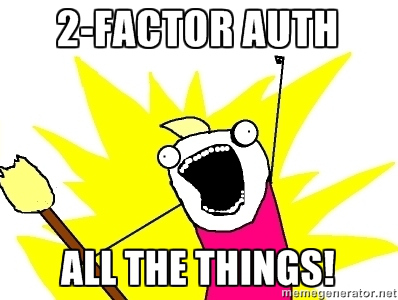A generator for counter based (RFC 4226) and time based (RFC 6238) one time passwords (OTP). (a.k.a. Yet Another Google Authenticator Implementation!)
- PHP 8.2+
ext-curlfor Steam Guard server time synchronizationext-sodiumfor constant time implementations of base64 encode/decode and hex2bin/bin2hex (paragonie/constant_time_encodingis used as fallback)
requires composer
via terminal: composer require chillerlan/php-authenticator
composer.json
{
"require": {
"php": "^8.2",
"chillerlan/php-authenticator": "dev-main"
}
}Note: replace dev-main with a version constraint, e.g. ^5.0 - see releases for valid versions
Profit!
The secret is usually being created once during the activation process in a user control panel. So all you need to do there is to display it to the user in a convenient way - as a text string and QR code for example - and save it somewhere with the user data.
use chillerlan\Authenticator\{Authenticator, AuthenticatorOptions};
$options = new AuthenticatorOptions;
$options->secret_length = 32;
$authenticator = new Authenticator($options);
// create a secret (stored somewhere in a *safe* place on the server. safe... hahaha jk)
$secret = $authenticator->createSecret();
// you can also specify the length of the secret key, which overrides the options setting
$secret = $authenticator->createSecret(20);
// set an existing secret
$authenticator->setSecret($secret);A secret created with Authenticator::createSecret() will also be stored internally,
so that you don't need to provide the secret you just created on follow-up operations with the current instance.
Now during the login process - after the user has successfully entered their credentials - you would ask them for a one time code to check it against the secret from your user database.
// verify the code
if($authenticator->verify($otp)){
// that's it - 2FA has never been easier! :D
}Verify adjacent codes
// try the first adjacent
$authenticator->verify($otp, time() - $options->period); // -> true
// try the second adjacent, default is 1
$authenticator->verify($otp, time() + 2 * $options->period); // -> false
// allow 2 adjacent codes
$options->adjacent = 2;
$authenticator->verify($otp, time() + 2 * $options->period); // -> true// switch mode to HOTP
$options->mode = AuthenticatorInterface::HOTP;
// user sends the OTP for code #42, which is equivalent to
$otp = $authenticator->code(42); // -> 123456
// verify [123456, 42]
$authenticator->verify($otp, $counterValueFromUserDatabase) // -> trueIn order to display a QR code for a mobile authenticator you'll need an otpauth:// URI, which can be created using the following method.
$labelshould be something that identifies the account to which the secret belongs$issueris the name of your website or company for example, so that the user is able to identify multiple accounts.
$uri = $authenticator->getUri($label, $issuer);
// -> otpauth://totp/my%20label?secret=NKSOQG7UKKID4IXW&issuer=chillerlan.net&digits=6&period=30&algorithm=SHA1Keep in mind that several URI settings are not (yet) recognized by all authenticators. Check the Google Authenticator wiki for more info.
// code length, currently 6 or 8
$options->digits = 8;
// valid period between 15 and 60 seconds
$options->period = 45;
// set the HMAC hash algorithm
$options->algorithm = AuthenticatorInterface::ALGO_SHA512;| method | return | description |
|---|---|---|
__construct(SettingsContainerInterface $options = null, string $secret = null) |
- | |
setOptions(SettingsContainerInterface $options) |
Authenticator |
called internally by __construct() |
setSecret(string $secret) |
Authenticator |
called internally by __construct() |
getSecret() |
string |
|
createSecret(int $length = null) |
string |
$length overrides AuthenticatorOptions setting |
code(int $data = null) |
string |
$data may be a UNIX timestamp (TOTP) or a counter value (HOTP) |
verify(string $otp, int $data = null) |
bool |
for $data see Authenticator::code() |
getUri(string $label, string $issuer, int $hotpCounter = null, bool $omitSettings = null) |
string |
| property | type | default | allowed | description |
|---|---|---|---|---|
$digits |
int |
6 | 6 or 8 | auth code length |
$period |
int |
30 | 15 - 60 | validation period (seconds) |
$secret_length |
int |
20 | >= 16 | length of the secret phrase (bytes, unencoded binary) |
$algorithm |
string |
SHA1 |
SHA1, SHA256 or SHA512 |
HMAC hash algorithm, see AuthenticatorInterface::HASH_ALGOS |
$mode |
string |
totp |
totp, hotp, battlenet or steam |
authenticator mode: time- or counter based, see AuthenticatorInterface::MODES |
$adjacent |
int |
1 | >= 0 | number of allowed adjacent codes |
$time_offset |
int |
0 | * | fixed time offset that will be added to the current time value |
$useLocalTime |
bool |
true | * | whether to use local time or request server time |
$forceTimeRefresh |
bool |
false | * | whether to force refreshing server time on each call |
| method | return | description |
|---|---|---|
setOptions(SettingsContainerInterface $options) |
AuthenticatorInterface |
|
setSecret(string $encodedSecret) |
AuthenticatorInterface |
|
getSecret() |
string |
|
createSecret(int $length = null) |
string |
|
getServertime() |
int |
|
getCounter(int $data = null) |
int |
internal |
getHMAC(int $counter) |
string |
internal |
getCode(string $hmac) |
int |
internal |
getOTP(int $code) |
string |
internal |
code(int $data = null) |
string |
|
verify(string $otp, int $data = null) |
bool |
| constant | type | description |
|---|---|---|
TOTP |
string |
|
HOTP |
string |
|
STEAM_GUARD |
string |
|
ALGO_SHA1 |
string |
|
ALGO_SHA256 |
string |
|
ALGO_SHA512 |
string |
|
MODES |
array |
map of mode -> classname |
HASH_ALGOS |
array |
list of available hash algorithms |








